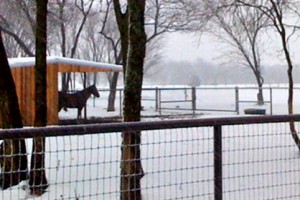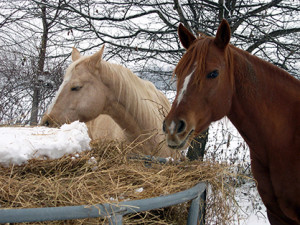Important Cold Weather Health Tips For Horse Owners
New Bolton Center
With snow already on the ground and temperatures dropping, Liz Arbittier, VMD, staff veterinarian in the Section of Equine Field Service at Penn Vet’s New Bolton Center, offers five important tips to keep horses healthy and safe during the cold days of winter.
1. Provide adequate shelter: Horses can do fine living outside through the winter. As long as they are metabolically healthy, receive enough calories, develop a nice winter hair coat, and have appropriate shelter, they can happily ride out a bad winter that has humans groaning. Most horses do not need to be blanketed, although waterproof/breathable blankets can help protect against driving wind and rain. Cold temperatures alone do not generally make horses uncomfortable, but wind and moisture can be difficult for them to tolerate, so they must be able to escape the elements. The best solution is a structural shelter that is big enough to allow all of the horses in that field to safely get out of the weather. One horse with a very dominant personality that won’t allow more submissive types into the shed may be a problem, so owners need to evaluate the personalities in the herd to ensure that this doesn’t happen.
2. Provide adequate calories: The phrase “bulking up for winter” is no joke! Horses expend significantly more calories keeping warm in the winter than they do any other time of year. High-quality hay should be the staple of any winter diet, especially for horses that are out a lot. They should have dry, fresh hay available at all times to keep their caloric losses less than their gains. Older horses or horses with significant dental disease that cannot eat hay productively need to be fed more frequently in a form that they can use, such as senior feeds.
3. Water not ice: One of the major causes for colic in the winter is an impaction caused by inadequate water intake. Technology has provided us with excellent solutions to that problem: heated water tubs and non-freezing automatic watering systems. If horses are outside, it is well worth the expense to run electricity to the fields for these devices to ensure a constant source of fresh water. Providing water is a relatively easy way to prevent a common winter colic that could end tragically.
4. Blanket consistently and check frequently: Blanketing for horses that live outside can be a necessity to keep them warm, dry, and happy. However, things can lurk under a blanket that can create a problem if not detected early. Bacterial skin disease, commonly known as rainrot, can occur if a horse with a thick hair coat is repeatedly sweating and then drying under a blanket. Changes in body condition, such as a horse that is losing weight rapidly, can also be missed if the blanket isn’t removed frequently to check. Finally, it is a good idea to take note of any new lumps and bumps that may not be seen with the blanket on.
5. Be smart about clipping: Horses have a thick winter hair coat designed to protect them. Many people who ride throughout the winter find it helpful to clip their horses to remove heavy hair that slows drying time after a ride. It is fine to turn out appropriately blanketed, clipped horses in the winter weather. However, owners should be very cautious about clipping horses that live outside through the winter because they will then need to be very diligent about blanketing as temperatures fluctuate. It isn’t fair to a horse to remove his winter woolies and then not blanket him well enough. Owners who have clipped their horses entirely, including the head and ears, need to be diligent about keeping them inside during excessively cold temperatures, as frostbite can occur.
About Penn Vet
Penn Vet is a global leader in veterinary medicine education, research, and clinical care. Founded in 1884, Penn Vet is the only veterinary school developed in association with a medical school. The school is a proud member of the One Health Initiative, linking human, animal, and environmental health.
Penn Vet serves a diverse population of animals at its two campuses, which include extensive diagnostic and research laboratories. New Bolton Center, Penn Vet’s large-animal hospital on nearly 700 acres in rural Kennett Square, PA, cares for horses and livestock/farm animals. The hospital handles more than 4,000 patient visits a year, while the Field Service treats nearly 36,000 patients at local farms. In addition, New Bolton Center’s campus includes a swine center, working dairy, and poultry unit that provide valuable research for the agriculture industry. Ryan Hospital in Philadelphia provides care for dogs, cats, and other domestic/companion animals, handling more than 31,000 patient visits a year.












